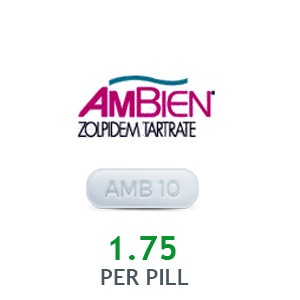Description
In 1993 the market of sleeping pills has changed once and for all, when a French company, today known as Sanofi, has released a brand-new medication Ambien. The drug based on zolpidem provides a similar to benzodiazepines action; however, it produces far fewer side effects. The safety of the remedy has pushed many doctors to violate the longstanding rule not to prescribe the drug for the treatment of non-chronic insomnia. Ambien has quickly conquered the market of hypnotic pills and grew up to several billion dollars niche; in the process of time it became one of the few medicines that took almost monopolistic position in the market.
Clinically it is shown that taking zolpidem is generally not accompanied by significant side effects. Only three patients (8.6%) reported a slight agitation, tremors, heaviness in the head, which took place in the afternoon, not regarded to as serious adverse events. Only one of these patients had insisted on stopping the therapy on 8 day of receiving zolpidem. Such data is significantly different from the information on the tolerability of other tranquilizers, patients used as sleeping pills earlier. It was also found that out of 15 patients treated with nitrazepam (9 cases), lorazepam (2 cases), Phenazepam (2 cases) and oxazepam (2 cases), side effects (usually manifested as daytime sleepiness) were observed in 33%.
How to take Ambien (Zolpidem)
The reception of Ambien is characterized by quick onset of action; therefore, it should be taken just before you go to bed or as soon as you lie in the bed. The drug should be taken only when it is possible to provide a sufficient duration of sleep no less than 7 – 8 hours. The recommended daily dose is selected by the doctor; however, on average adults are appointed 5 – 10 mg of the drug in a single intake.
The elderly and patients with serious conditions may be especially susceptible to the drug’s effect, therefore, the daily dosage in such patients should be decreased to 5 mg. The total daily dose of zolpidem should not exceed 10 mg. The clearance and metabolism of zolpidem reduced in renal failure, so in these patients, the treatment should start from no more than 5 mg. Appointing the drug in the elderly should be carried out with caution. If adequate therapeutic response is not achieved and the drug is well tolerated, in adults (aged 65+ years) the dose can be increased to 10 mg. The long-term use of Ambien, as well as of any other hypnotics, is not recommended; the duration of treatment should not exceed 4 weeks. There is no comprehensive clinical data on the risks of taking the drug during pregnancy or lactation; ask your doctor whether taking Ambien is a beneficial option in your case.

